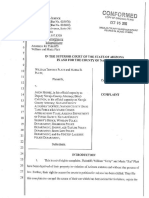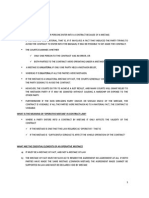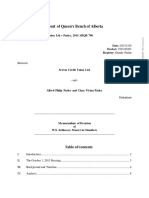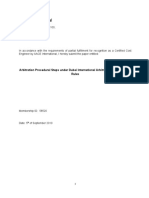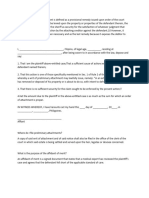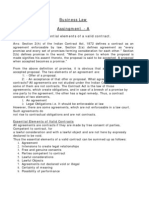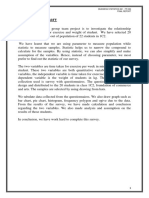100%(1)100% found this document useful (1 vote)
674 viewsRemedies Four Steps
Remedies Four Steps
Uploaded by
Oneway BongQueenie hired Toni to paint her portrait, but Toni breached their contract by refusing to complete the work. Queenie is entitled to various remedies under the law. She can terminate the contract and reject further performance from Toni. Queenie can also claim damages to recover her $3,000 payment and put her in the same financial position as if Toni had fulfilled the contract. While specific performance of the painting is not available, Queenie could seek an injunction to prevent Toni from working for others in breach of their agreement.
Copyright:
© All Rights Reserved
Available Formats
Download as DOCX, PDF, TXT or read online from Scribd
Remedies Four Steps
Remedies Four Steps
Uploaded by
Oneway Bong100%(1)100% found this document useful (1 vote)
674 views4 pagesQueenie hired Toni to paint her portrait, but Toni breached their contract by refusing to complete the work. Queenie is entitled to various remedies under the law. She can terminate the contract and reject further performance from Toni. Queenie can also claim damages to recover her $3,000 payment and put her in the same financial position as if Toni had fulfilled the contract. While specific performance of the painting is not available, Queenie could seek an injunction to prevent Toni from working for others in breach of their agreement.
Original Description:
remedies four step -Blaw
Copyright
© © All Rights Reserved
Available Formats
DOCX, PDF, TXT or read online from Scribd
Share this document
Did you find this document useful?
Is this content inappropriate?
Queenie hired Toni to paint her portrait, but Toni breached their contract by refusing to complete the work. Queenie is entitled to various remedies under the law. She can terminate the contract and reject further performance from Toni. Queenie can also claim damages to recover her $3,000 payment and put her in the same financial position as if Toni had fulfilled the contract. While specific performance of the painting is not available, Queenie could seek an injunction to prevent Toni from working for others in breach of their agreement.
Copyright:
© All Rights Reserved
Available Formats
Download as DOCX, PDF, TXT or read online from Scribd
Download as docx, pdf, or txt
100%(1)100% found this document useful (1 vote)
674 views4 pagesRemedies Four Steps
Remedies Four Steps
Uploaded by
Oneway BongQueenie hired Toni to paint her portrait, but Toni breached their contract by refusing to complete the work. Queenie is entitled to various remedies under the law. She can terminate the contract and reject further performance from Toni. Queenie can also claim damages to recover her $3,000 payment and put her in the same financial position as if Toni had fulfilled the contract. While specific performance of the painting is not available, Queenie could seek an injunction to prevent Toni from working for others in breach of their agreement.
Copyright:
© All Rights Reserved
Available Formats
Download as DOCX, PDF, TXT or read online from Scribd
Download as docx, pdf, or txt
You are on page 1of 4
Step 1: Identify the principal or issue of law
The principal or issue of law is remedies for breach of contract.
Step 2: Explain the rule(s) of law relevant to the principle/area/issue of law
identified in step one with reference to authority
A contract is discharged by complete performance, but when there is a failure to
perform, a breach of contract occur. In this circumstances, the innocent party is
entitled to claim a remedy.
The innocent party can choose what remedy they seek for from the court. They
can ask for a combination of remedies or an alternate remedy should the court
not entertain their preferred choice.
There are two types of remedies which are common law remedies and equitable
remedies. Common law remedies categories into termination and claim for
damages. Equitable remedies categories into specific performances and
injunction.
In common law, termination allows the innocent party to reject the attempted
performance and put an end to any further specific performance of outstanding
obligation. Termination of performance is only available as a remedy for
relatively serious breaches of contract. An innocent party who seek a remedy
must be able to prove a breach of a condition.
In the case of Associated Newspapers Ltd v Bancks (1951) 83 CLR 322, Bancks
a cartoonist agreed to produce a weekly full-page drawing for Associated
Newspaper with a pay of salary and published on the front page of the
newspaper comic section. However, he realise that his drawings appeared on the
third page of the comic section. Bancks had expressed his dissatisfied but
Associated Newspaper ignored him. Bancks decided to terminate the further
performance of the contract. In this case, court justified Bancks to terminate the
contract because the promise to publish Bancks drawings on front page of
comics section is an essential term to let his entered the contract.
Claim for damages is an award of money to compensate for a loss. Damages are
not a punishment, there are compensatory. The aim of damage is to put the
innocent party in the financial position they would have been in had the contract
been properly performed.
In the case of Radford v de Froberville [1978] 1 All ER 33, Radford owned two
adjacent blocks of land and he sold one to de Froberville on condition to build
an expensive brick wall on the boundary. However, she failed to build and
resold to third party. Radford sued de Froberville for damages for breach of
contract. The issue of contract is what was the appreciate measure of damages.
The court stated that Radford was entitle to claim for damages equal to the cost
of actually constructing the wall.
Only those losses flowing from the breach of contract can be compensated.
Losses that are too remote, unforeseeable will not be claimable as damages.
Damages can be claimed to compensate for two type of loss which are direct
loss and consequential loss.
Direct loss occurring in the usual or normal course of things from the breach.
This can seen in the case of Victoria Laundry (Windsor) Ltd v Newman
Industries Ltd [1949] 2 KB 528. Newman sold a boiler to Victoria but the boiler
was delivery five months late. As a result of not having enough laundry
capacity, Victoria Laundry lost of ordinary profit and missed out their lucrative
contract with government. Victoria Laundry sued Newman and sought to claim
both losses. The issue was whether Victoria could claim for the losses. The
decision was they only could claim the loss of ordinary profit. The loss of the
cleaning contract with the government was too remote to be claimed, especially
considering that no notice brought to attention of Newman.
Consequential loss is occur as a result of special or exceptional circumstances
where the risk of such loss was made known to the other party at the time the
contract was entered into. In the case of Hadley v Baxendale (1854) 2 CLR 517;
9 Exch 341. The crankshaft of Hadley mill broke, bringing operations to a
complete halt. Regarding the request of the manufacturer to have the broken
shaft for replacement, Hadley consigned broken shaft to Baxendale a carrier to
deliver to the manufacturer on next day. However, he delayed for several days.
Hadley claimed damages for breach of contract from Baxendale to compensate
for the loss of profits caused by the delayed. The issue of the court is whether
Hadley entitled to compensation for the loss profit. The court decided that
Hadley was not entitled because normally it would be expected that a mill have
a spare shaft and it was not reasonably foreseeable that a broken shaft would
cause a complete halt of production.
Besides, damage usually not awarded to compensate a party who suffered
disappointed and distress as a result of a breach of contract, except when the
contract was for the provision of enjoyment, relaxation or pleasure.
In the case of Baltic Shipping Co v Dillon [1993] HCA 4; (1993) 176 CLR 344,
Dillon booked and paid for cruise on a passenger ship. Few day later, the ship
struck a rock and sank. Apart from physical injuries and emotional trauma,
Dillon suffered from disappointed and distress. She sued Baltic Shipping for
damages to compensate this. The issue of the court was whether Dillon entitled
to damages for disappointed and distress from a breach of contract. The decision
was the damages should be awarded because the defaulting party agreed to
provide a pleasure and relax vacation.
The plaintiff will not be able to recover any loss that could have been avoided
by the exercise of reasonable care. If the plaintiff takes reasonable steps to avoid
loss but suffer further loss, the defendant will be liable for that further loss.
Where the plaintiff successfully avoids loss by taking mitigating action, the
defendant is only liable for the reduced loss.
In the case of Burns v Man Automotive (Aust) Pty Ltd (1986) 161 CLR 653,
MAN Automotive supplied a large commercial vehicle to Burns but the vehicle
supplied was defective. However, Burns persisted in trying to use it and
accumulated substantial operating losses in the process. Burns sued for damage
to compensate for lost profits. The issue is to what extent must a plaintiff take
steps to mitigate losses. The decision was a plaintiff is not required to take steps
to mitigate loss if the plaintiff does not have the necessary meant to do so.
Specific performance is a court order to perform as promised under contract
when a compensation is an inadequate damage. Specific performances is not
available for personal service contract and continual supervision of court
necessary. In the case of Lumley v Wagner (1852) 42 ER 687, Wagner
contracted to sing in Lumleys theatre for fixed period. She also promised that
during this period, she would not to perform anywhere else. Lumley wished to
enforce both of those promised. The issue of the court was whether the court
would enforce specific performance of Wagner promise to sing in Lumleys
theatre. The court decided that actual performance of this promise would not be
ordered.
Injunctions are court order requiring a person to do or not do something. Before
injunction is granted, plaintiff must show legal right of a proprietary nature,
infringement is likely to continue or be repeated, damages are an inadequate
remedy and contract is final expression of parties rights. This can show in case
of Buckenara v Hawthorn Football Club Ltd [1988] VR 39. Buckenara was a
football player contracted to play for the Hawthorn Football Club. As part of
agreement, Buckenara promised not to play for any competing club while
contracted to Hawthorn. When it seemed that Buckenara intended to play for
competing club, Hawthorn sought an injunction to prevent the threatened breach
of contract. The issue of the court is would the court issue an injunction to
prevent breach of contract. The court ordered Buckenara not to play for any
other club which was in competition with Hawthorn because there is a
threatened breach of contract.
Step 3: Apply the law to the facts of the question in a detailed and logical
manner
When a breach of contract occurs, Queenie is entitled to claim a remedy from
Toni. By looking at the facts of scenario, Toni is defendant and Queenie is
plaintiff. Tony had breach the contract as he refused to complete the portrait of
Queenie. At common law, Queenie is entitled to terminate the contract by
rejecting the attempted performances and put an end to any further specific
performance of outstanding obligations by Toni.
Moreover, Queenie entitled to claim for damages because the aim of damages is
to put the innocent party in this case Queenie in the financial position she would
have been in had the contract been properly performed and therefore, Queenie
would be able to claim damages equal to the cost of complete painting. Queenie
also entitled to claim back the upfront payment of $3000 as Toni partial
performance the portrait of Queenie as direct loss which occurred in the usual or
normal course of things from the breach. However, Queenie may not able to
claim for damages od disappoint and distress due to incomplete portrait on the
contract is for painting portrait not for the provision of enjoyment, relaxation
and pleasure.
In this circumstances, specific performance is not available for Queenie as
painting a portrait is a personal service. As stated in the case, Queenie had
included a term stating that Toni is not to work for other within duration of
contract. Therefore, Queenie entitle sought an injunction to prevent the
threatened breach of contract.
Step 4: Draw possible conclusion
In conclusion, Queenie can claim for common law remedies and equitable
remedies in this case.
You might also like
- Tibor Kalman PDFDocument13 pagesTibor Kalman PDFThania Aquino0% (1)
- Kitsch LLC v. DEEJAYZOO - ComplaintDocument13 pagesKitsch LLC v. DEEJAYZOO - ComplaintSarah BursteinNo ratings yet
- 6 PDFDocument9 pages6 PDFSÚI - GÉNERIS100% (1)
- Character Bible Fujimaki InterviewDocument8 pagesCharacter Bible Fujimaki InterviewJenny Dawn ValdezNo ratings yet
- Chapter 13 Bankruptcy in the Western District of TennesseeFrom EverandChapter 13 Bankruptcy in the Western District of TennesseeNo ratings yet
- A Short View of the Laws Now Subsisting with Respect to the Powers of the East India Company To Borrow Money under their Seal, and to Incur Debts in the Course of their Trade, by the Purchase of Goods on Credit, and by Freighting Ships or other Mercantile TransactionsFrom EverandA Short View of the Laws Now Subsisting with Respect to the Powers of the East India Company To Borrow Money under their Seal, and to Incur Debts in the Course of their Trade, by the Purchase of Goods on Credit, and by Freighting Ships or other Mercantile TransactionsRating: 3 out of 5 stars3/5 (1)
- Navajo County RICO LawsuitDocument40 pagesNavajo County RICO LawsuitDave BiscobingNo ratings yet
- Abe Voidable and Void ContractsDocument29 pagesAbe Voidable and Void Contractsmponda1h4331No ratings yet
- Leyah Yisrael Ucc Financing StatementDocument35 pagesLeyah Yisrael Ucc Financing StatementLeyah YisraelNo ratings yet
- CFPB Consent Order Encore Capital GroupDocument63 pagesCFPB Consent Order Encore Capital GroupSamuel RichardsonNo ratings yet
- Specific Contract Full Notes - 231011 - 192140Document150 pagesSpecific Contract Full Notes - 231011 - 192140Sereena C SNo ratings yet
- Florida Exemptions BankruptcyDocument1 pageFlorida Exemptions Bankruptcycottchen6605No ratings yet
- T C P C N - 1: Ravis Ounty Robate Ourt ODocument2 pagesT C P C N - 1: Ravis Ounty Robate Ourt OLexuNo ratings yet
- Law - Contract & AgencyDocument25 pagesLaw - Contract & Agencymontasirahmed100% (1)
- Affidavit in Support of Complaint For Breach of Fiduciary Duty by Public Officers PDFDocument17 pagesAffidavit in Support of Complaint For Breach of Fiduciary Duty by Public Officers PDFL03A06No ratings yet
- A Method To Obtain An Allodial Title To Your PropertyDocument1 pageA Method To Obtain An Allodial Title To Your PropertyrndvdbNo ratings yet
- Concept of Offer and Acceptance in Law of ContractDocument4 pagesConcept of Offer and Acceptance in Law of ContractSimon JnrNo ratings yet
- United States Bankruptcy Court: Southern District of West VirginiaDocument54 pagesUnited States Bankruptcy Court: Southern District of West VirginiaWVGOP Research100% (1)
- Court Request For ProceedsDocument3 pagesCourt Request For ProceedschersmauiNo ratings yet
- ROWLAND Et Al v. OCWEN LOAN SERVICING, LLC. Et Al Notice of RemovalDocument6 pagesROWLAND Et Al v. OCWEN LOAN SERVICING, LLC. Et Al Notice of RemovalACELitigationWatchNo ratings yet
- Safe Deposit Bank and Trust Company v. Eugene B. Berman, Trustee, in The Matter of Fernandes Welding & Equipment Service, Inc., Bankrupt, 393 F.2d 401, 1st Cir. (1968)Document5 pagesSafe Deposit Bank and Trust Company v. Eugene B. Berman, Trustee, in The Matter of Fernandes Welding & Equipment Service, Inc., Bankrupt, 393 F.2d 401, 1st Cir. (1968)Scribd Government DocsNo ratings yet
- The New Direct Tax Code (DTC)Document18 pagesThe New Direct Tax Code (DTC)aggarwalajay2No ratings yet
- CFPB Transunion Rental Screening Solutions Inc Trans Union LLC Complaint 2023 10Document16 pagesCFPB Transunion Rental Screening Solutions Inc Trans Union LLC Complaint 2023 10dkanellisNo ratings yet
- MR Motil's Response To Capital One's Motion To Amend ClaimDocument8 pagesMR Motil's Response To Capital One's Motion To Amend ClaimRobert Lee Chaney100% (1)
- What Are SecuritiesDocument12 pagesWhat Are SecuritieszahreenamolinaNo ratings yet
- THE UNITED STATES FEDERAL COURT Addendum OF PARTIES NotificationDocument4 pagesTHE UNITED STATES FEDERAL COURT Addendum OF PARTIES NotificationL&X LoV&No ratings yet
- Letter Regarding Recission of ContractDocument1 pageLetter Regarding Recission of ContractJoreseNo ratings yet
- Local Rules v12 - Revised 7-1-16Document99 pagesLocal Rules v12 - Revised 7-1-16David BriggsNo ratings yet
- Application For Bond ReviewDocument2 pagesApplication For Bond ReviewPeter IckesNo ratings yet
- Robertmenard FreedomDocument3 pagesRobertmenard FreedomjrodNo ratings yet
- Cas-T2020-88 Daniel J. LavigneDocument109 pagesCas-T2020-88 Daniel J. LavigneMNo ratings yet
- Miller Et Al V Homecomings FinDocument22 pagesMiller Et Al V Homecomings FinA. CampbellNo ratings yet
- Servus Credit Union LTD V Parlee, 2015Document33 pagesServus Credit Union LTD V Parlee, 2015ravenmailmeNo ratings yet
- Entitlement and Procedure For Purchase ofDocument5 pagesEntitlement and Procedure For Purchase ofMayank_Nagpal_8510No ratings yet
- Petition For Writ of Quo WarrantoDocument30 pagesPetition For Writ of Quo WarrantoStephen MonaghanNo ratings yet
- General Instructions For Certain Information Returns: RemindersDocument19 pagesGeneral Instructions For Certain Information Returns: Remindersmstinson1No ratings yet
- Demand by Secured Party For Possession of CollateralDocument2 pagesDemand by Secured Party For Possession of CollateralconsultFLETCHERNo ratings yet
- Notice and Demand For Payment of A Dishonored Check PDFDocument1 pageNotice and Demand For Payment of A Dishonored Check PDFKemNo ratings yet
- Aref El Husseiny /contracts Manager - Arbiration Procedural Steps Under Dubai International Arbitration Center RulesDocument16 pagesAref El Husseiny /contracts Manager - Arbiration Procedural Steps Under Dubai International Arbitration Center RulesAref El Husseiny50% (2)
- Story - Big.shane Family of BuczekDocument17 pagesStory - Big.shane Family of BuczekShane Christopher Family of BuczekNo ratings yet
- Inquiry Removal Letter 1aDocument1 pageInquiry Removal Letter 1aYarod ELNo ratings yet
- Shanes Global Motion To DismissDocument12 pagesShanes Global Motion To DismissshanebuczekNo ratings yet
- New York - Modern World Trade Center David WetzelDocument113 pagesNew York - Modern World Trade Center David WetzelDUTCH551400No ratings yet
- In The Matter of Property Seized For Forfeiture From Address 2109 320th Street, Lake View, Iowa 51450Document7 pagesIn The Matter of Property Seized For Forfeiture From Address 2109 320th Street, Lake View, Iowa 51450thesacnewsNo ratings yet
- Constructive TrustsDocument13 pagesConstructive TrustsSooNo ratings yet
- Schneider Sent First American A RESPA Qualified Written Request, Complaint, and Dispute of Debt and Validation of Debt LetterDocument9 pagesSchneider Sent First American A RESPA Qualified Written Request, Complaint, and Dispute of Debt and Validation of Debt Letterlschneider68No ratings yet
- 2009 The Civil Asset Forfeiture Reform Act of 2000Document65 pages2009 The Civil Asset Forfeiture Reform Act of 2000tofumasterNo ratings yet
- Chapter 7-Law of InsuranceDocument9 pagesChapter 7-Law of Insuranceworkineh meleseNo ratings yet
- Plea Agreement, U.S. vs. Baoke ZhangDocument19 pagesPlea Agreement, U.S. vs. Baoke ZhangGeekWireNo ratings yet
- Fouts V Becerra (Baton Second Amendment) ComplaintDocument14 pagesFouts V Becerra (Baton Second Amendment) Complaintwolf woodNo ratings yet
- Diplomatic Buyers Guide EDocument16 pagesDiplomatic Buyers Guide EAtsushiNo ratings yet
- 6 Contract - RemediesDocument4 pages6 Contract - RemediesglenlcyNo ratings yet
- AFFIDAVITDocument14 pagesAFFIDAVITLeorebelle Racelis100% (1)
- Credit Derivatives Not InsuranceDocument59 pagesCredit Derivatives Not InsuranceGlobalMacroForum100% (1)
- Masterfile Settlement Demand Letter: 1st Contact DieselfishDocument5 pagesMasterfile Settlement Demand Letter: 1st Contact DieselfishExtortionLetterInfo.comNo ratings yet
- Washington Attorney General's Office ComplaintDocument30 pagesWashington Attorney General's Office ComplaintNat LevyNo ratings yet
- Indemnity and GuaranteeDocument20 pagesIndemnity and GuaranteeShrey ApoorvNo ratings yet
- United States Court of Appeals Tenth CircuitDocument12 pagesUnited States Court of Appeals Tenth CircuitScribd Government DocsNo ratings yet
- ADL 12 Business Laws V4Document26 pagesADL 12 Business Laws V4Aditya BhatNo ratings yet
- Check 21 ActDocument19 pagesCheck 21 ActTimothy O'HaverNo ratings yet
- Executive Summary: Business Statistics 061 - Fp-036 Final ReportDocument35 pagesExecutive Summary: Business Statistics 061 - Fp-036 Final ReportOneway BongNo ratings yet
- Background Questions Prasanna Suraweera Sustainability Section Manager Principal Wood GrieveDocument16 pagesBackground Questions Prasanna Suraweera Sustainability Section Manager Principal Wood GrieveOneway Bong0% (1)
- Bong Woan Huey: Career Objective/Profile/SummaryDocument2 pagesBong Woan Huey: Career Objective/Profile/SummaryOneway BongNo ratings yet
- EHD Presentation FAQ (Summer 2017)Document1 pageEHD Presentation FAQ (Summer 2017)Oneway BongNo ratings yet
- Reflective EssayDocument9 pagesReflective EssayOneway BongNo ratings yet
- BIT AssessmentDocument18 pagesBIT AssessmentOneway BongNo ratings yet
- Types Using Real-World ExamplesDocument3 pagesTypes Using Real-World ExamplesOneway BongNo ratings yet
- EcotourismDocument12 pagesEcotourismOneway BongNo ratings yet
- Editorial Cartooning - JAY VISPERASDocument61 pagesEditorial Cartooning - JAY VISPERASDanicaNo ratings yet
- Y8 Pop Art Project Task 2Document2 pagesY8 Pop Art Project Task 2api-293503824100% (1)
- Barbarella - Roger Vadim (1968) - Film ReviewDocument3 pagesBarbarella - Roger Vadim (1968) - Film ReviewJake BryantNo ratings yet
- Catfight - Escape From LimboDocument28 pagesCatfight - Escape From LimboMichael L. RickabyNo ratings yet
- Disney Witches Eiu 4155 Spring 2016Document11 pagesDisney Witches Eiu 4155 Spring 2016api-301991030No ratings yet
- Benign Violation v4Document7 pagesBenign Violation v4TIBARI TIBARINo ratings yet
- Chromatic Harmony Marking SchemeDocument3 pagesChromatic Harmony Marking SchemeAmy Kalairajah100% (1)
- Step 2 Bye Stan StudentDocument2 pagesStep 2 Bye Stan StudentANo ratings yet
- Jewish Comics and Graphic NarrativesDocument209 pagesJewish Comics and Graphic NarrativesTachita Vlad-BubulacNo ratings yet
- Anne Frank Relaunched in The World of Comics and Graphic NovelsDocument3 pagesAnne Frank Relaunched in The World of Comics and Graphic NovelsNelson FernandoNo ratings yet
- Ltd. - Manga Historical Characters (2013) PDFDocument37 pagesLtd. - Manga Historical Characters (2013) PDFArmando Suetonio Amezcua100% (6)
- Tactimania Book ReviewDocument5 pagesTactimania Book ReviewElvin RodriguezNo ratings yet
- Ziggy: Safari Power Saver Click To Start Flash Plug-InDocument24 pagesZiggy: Safari Power Saver Click To Start Flash Plug-InChinmay BhalkeNo ratings yet
- F Arthow To Draw PDF Library Basic Figure Manga ComicDocument2 pagesF Arthow To Draw PDF Library Basic Figure Manga ComicJessicaNo ratings yet
- Timeline AnimationDocument2 pagesTimeline AnimationEusoffe UzihanNo ratings yet
- Gotham CityDocument7 pagesGotham CityAlba PuertasNo ratings yet
- 5 FREE Prompts For Trending October Niches PDFDocument2 pages5 FREE Prompts For Trending October Niches PDFJaroslawNo ratings yet
- What Was Phillip Stark ThinkingDocument17 pagesWhat Was Phillip Stark ThinkingAmelia HerreraNo ratings yet
- WTW ChoicesDocument2 pagesWTW Choicesapi-298062836No ratings yet
- Marvel Ultimate Alliance GuideDocument31 pagesMarvel Ultimate Alliance GuideLong MathiasNo ratings yet
- Comics Novelas y Otros (Vértigo y Otras Compañías) Sin CityDocument7 pagesComics Novelas y Otros (Vértigo y Otras Compañías) Sin Cityxd456852xdNo ratings yet
- CómicsDocument10 pagesCómicsRosangela Alva AlvaNo ratings yet
- English - The Best We Could DoDocument4 pagesEnglish - The Best We Could DoCindy WangNo ratings yet
- Summative Test in English 8 Q2Document5 pagesSummative Test in English 8 Q2Nelissa Pearl Coloma100% (1)
- Roman GubernDocument125 pagesRoman Gubernedgardoalbornoz_70% (1)
- Featurette On "The Avengers" Motion-Capture Hulk Performer Steve RommDocument1 pageFeaturette On "The Avengers" Motion-Capture Hulk Performer Steve RommFrank LoveceNo ratings yet
- Instant Download Classics and Comics 1st Edition George Kovacs PDF All ChapterDocument84 pagesInstant Download Classics and Comics 1st Edition George Kovacs PDF All Chaptermendeishanek100% (3)







